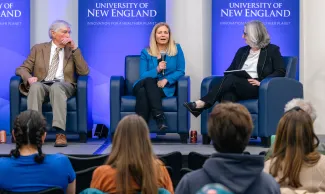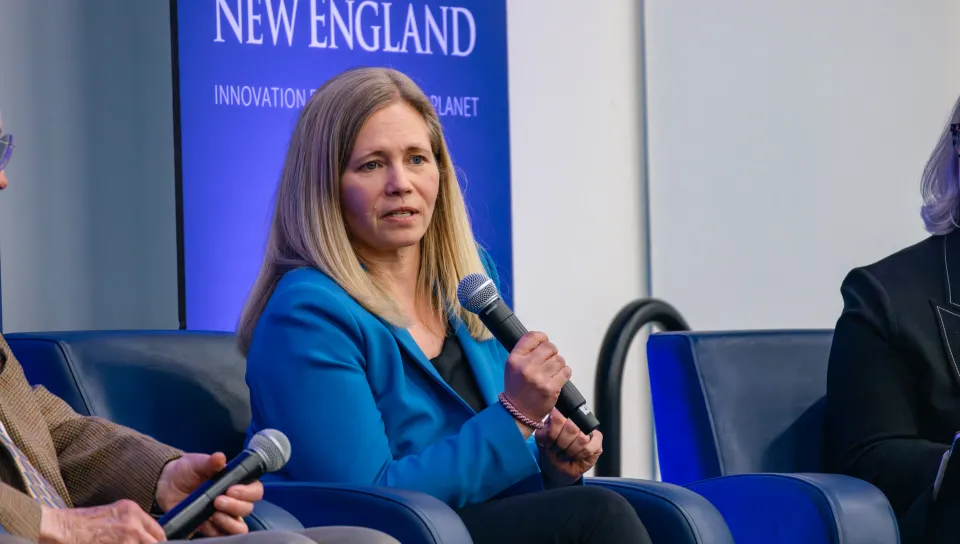
Three experts from different sectors consider how to develop climate-change leaders
Tackling the world’s most challenging problems takes innovative, nimble leaders. The University of New England is taking a new approach to addressing the climate crisis by rolling out a master’s degree in climate-change leadership this fall.
To help offer a hint of what that new degree program will look like, the University hosted a panel discussion with an interdisciplinary group of experts who came together on April 15 in the Harold Alfond Forum on the Biddeford Campus to discuss how to best educate the climate changemakers of tomorrow at the event “Innovation in Climate Education.”
UNE President James Herbert welcomed the panelists, students, faculty, professional staff, and members of the Biddeford community by reminding them the work ahead is already baked into UNE’s mission statement.
“We must address the health of our planet, the health of our communities, and the health of individuals in an interconnected way,” Herbert said. “Doing so requires, of course, the hard sciences, the natural sciences, and engineering, no question. But it also, if we're going to effectively address climate change, requires the social sciences, the humanities, and the arts. It really does.”
UNE’s 100% online Master of Science in Climate Change Leadership degree program will offer concentrations in marine and environmental science, public health, and sustainable business.


UNE North Director Cameron Wake, Ph.D., the moderator and one of the event’s organizers, echoed the need to take an interdisciplinary approach to addressing climate change — which also was the approach taken in creating the event. UNE North hosted the event alongside UNE Online, the Office of Sustainability, and School of Marine and Environmental Programs.
“If we are going to accelerate the pace at which we transition to a low-carbon, climate-resilient society, we are going to need many more educated and experienced professionals from every discipline and every sector,” Wake said.
Likewise, the panelists brought an interdisciplinary approach to the lively discussion in Alfond Forum, building off and delving into each other’s ideas and suggestions.
Hanna Pingree, the director of the Maine Office of Policy Innovation and the Future, explained how her office helped to put together the first state climate action plan in 2020, making Maine a national leader in many areas of clean energy, such as in heat pump deployment. What that process taught her, Pingree said, was the power in engaging people from across Maine by meeting them where they live in town-hall style forums.
“We had all of the scientists, all of the business leaders, all of the people who needed to take action in the room. We came up with the strategies and then we went out to talk to Maine people (to ask:) Are these the right strategies? Will this work? We traveled the state,” said Pingree, who also was appointed by Gov. Janet Mills in 2019 to co-chair the Maine Climate Council that leads climate planning for the state.
“What I have learned is that the work that we are trying to do in the state of Maine requires leadership; it requires committed citizens; and it requires many, many more people being in this fight,” Pingree added.





Fiona Wilson, the University of New Hampshire’s chief sustainability officer and the executive director of the Sustainability Institute, played off Pingree’s suggestion to pull together different communities to find solutions to the climate crisis by offering data that showed: This kind of full-court-press approach is exactly what young people want.
Wilson quoted surveys that show 85% of young Americans say they are very worried about climate change, 43% say it’s impacting their mental health, and 40% say it negatively affects their daily lives. Moreover, over 40% of Gen Z said they’ve actually left a job now or planned to leave a job because of climate or sustainability concerns that their employer is not doing enough, Wilson added.
“Gen Z, and Gen Alpha that is coming behind them, is a generation who is deeply aware of the climate crisis, but they also really want to be part of solutions. You are very clear that you want to work for and invest in companies and organizations that you think reflect your values,” Wilson said to the students in the audience.
Wilson was critical of academia today, noting that too many universities are built around silos in the form of academic programs and different colleges that never work together.
“The problems of the climate crisis and sustainability — they don't work in silos,” Wilson said. “In fact, the opposite is true. We need to have people from different sectors, different disciplines coming together and innovating and collaborating.”
Robert Lawrence, professor emeritus from Johns Hopkins University and the founder of the Center for a Livable Future at Hopkins’ Bloomberg School of Public Health, said the complexity of climate change on human health is far greater than experts thought a few years ago. He pointed to the increase in cardiovascular and pulmonary disease, the rise in vector-borne diseases, such as Lyme disease and malaria, and the mental health crisis surrounding climate change.
To develop a workforce that’s capable of solving all these climate problems, Lawrence suggested adopting case-method teaching, which would allow groups to work together across disciplines.
“It would also allow people to work with non-science, health science faculties, and students,” he said. “We need that desperately.”
Then Lawrence, a former director at Harvard Medical School and at the Rockefeller Foundation, where he participated in human rights investigations for organizations around the world, offered himself as an example.
“I alone know the health consequences of heat islands, but know nothing about architecture or about forestry, or what trees might be best planted in urban areas to have the cooling effect that we now have documented and so forth,” Lawrence said. “So that's my plea: Think about multidisciplinary case method teaching and pull in all these different strands that are impacting us through climate change.”